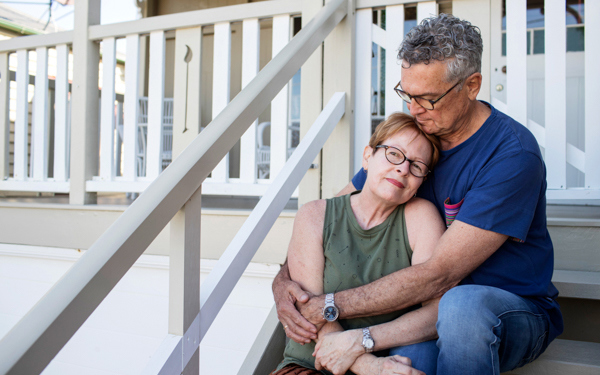Support for carers and families
As a relative, partner, friend or neighbour of someone with cancer, it’s likely you will be a source of care and support to your loved one throughout their diagnosis and treatment.
Whether you’re in a more formal carer role or helping out as they need, it can take time to adjust to the role which may continue to change over time.
What can I do to help?
As a support person or carer you may help in the following ways:
Medical
Navigating treatment and keeping track of the different information can be overwhelming for the person with cancer. You can provide support by helping them manage their medical journey. This might mean helping keep a diary of symptoms and side effects, taking notes during appointments, managing medications and upcoming appointments, or working with the care team to help make care and treatment decisions for your loved one.
Practical
Someone with cancer can feel like their life is on hold. In addition to managing appointments and treatment, the person with cancer can often be experiencing physical side effects that impact their day-to-day life. Providing practical support such as cleaning the home, preparing meals or helping to care for children are often appreciated. You could also provide transport to and from treatment or ask if there are any regular activities you could take care of for the time being.
Emotional
Sometimes just being there for your loved one and offering your companionship can mean the most. Some ways to provide emotional support include being a good listener, providing comfort and understanding, communicating with family and friends, or helping access professional support if needed.
Legal and financial
Helping a person with cancer get their affairs in order can make things much easier for them and their family at a difficult time. This might mean assisting with paperwork or arranging to see a lawyer to make legal arrangements, or helping find the right support to manage the financial impact of cancer.
Where can I find support?
The role of a carer or support person is rewarding, yet demanding. Whether you’re new to the responsibilities of providing care or you’ve been doing it for some time, it’s important to take the time to look after yourself.
Just as there are many services available to those with cancer, as a carer you can also access professional services and support programs to help make things a little easier.
The national body representing Australia’s carers. Carers Associations are available in each state and territory, and can help with referrals, counselling and support.
Practical information and resources for carers, and links to support services in your local area.
Cancer Council has many professional services and support programs to help make the life of a carer easier. They can also provide referrals to counselling services, as well as peer support programs that you can connect with online, by phone or in person.
Offers financial support for people with a long-term illness and for primary carers.
Counselling and grief support
Offers short-term counselling for carers. The program is delivered in person, by telephone, one-on-one or in a group. The NCCP service is run by your local Carers Association.
Online information for people experiencing grief.
Medicare-subsidised referral to psychological counselling through your GP.
Community and family services to support all Australians who have experienced a loss.

